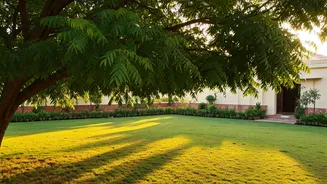Vastu for Homes
Vastu Shastra offers guidance on creating a harmonious living environment. Planting specific trees in front of your house is considered beneficial for
attracting positive energy and promoting well-being. These trees are believed to influence the energy flow within the home, leading to health, wealth, and overall positivity. The placement and choice of trees are crucial aspects of Vastu, with different trees holding unique significance and benefits for the residents. Carefully selecting and positioning trees can significantly impact the atmosphere and energy of your home, aligning it with Vastu principles.
The Neem Tree's Benefits
The Neem tree is highly regarded for its health and protective qualities. Planting a Neem tree near your home entrance is believed to safeguard the residents from various ailments. The Neem tree’s properties are believed to purify the air and create a healthy environment. Historically, Neem has been used in traditional medicine for its medicinal properties. In Vastu, the Neem tree is considered auspicious and contributes to a positive energy flow. Its presence is thought to bring protection and well-being, enhancing the overall atmosphere of the home. The Neem tree's ability to ward off negative influences makes it a favored choice in Vastu practices.
Coconut Tree's Purity
The Coconut tree is often linked to purity and protection, according to Vastu Shastra. Planting a Coconut tree is thought to invite positive energy and shield the home from negativity. The Coconut tree is a symbol of purity, representing a wholesome and sacred influence. Its presence is believed to enhance the overall ambiance, creating a balanced and auspicious atmosphere. The tree's association with protection suggests it can deflect harmful energies, promoting peace and harmony within the household. The Coconut tree's graceful appearance and symbolic value make it a valuable addition to homes, fostering a sense of well-being.
Mango Tree's Auspiciousness
The Mango tree is considered a symbol of prosperity and auspiciousness in Vastu. Planting a Mango tree near your house is believed to attract good fortune and bring positive influences into your life. The Mango tree’s presence is seen as a sign of wealth and success, contributing to a prosperous environment. It is thought to create a favorable atmosphere, enhancing the home's positive energy. Traditionally, Mango trees are associated with celebrations and happiness, making them a welcome addition to the home's surroundings. The tree’s symbolism contributes to an environment of good fortune and well-being.
Banana Tree's Importance
The Banana tree holds religious and auspicious significance in Vastu. Planting a Banana tree can bring blessings and favorable influences into the home, according to Vastu Shastra. Its presence is considered sacred, promoting spiritual well-being and positive energy flow. The Banana tree is associated with growth, abundance, and prosperity. It is frequently seen in religious ceremonies, highlighting its importance. The Banana tree enhances the home's overall atmosphere, creating an auspicious environment conducive to peace and harmony. Its symbolic value and positive associations make it a revered choice for enhancing the home's energy.
Peepal Tree's Spirituality
The Peepal tree is considered a source of spiritual energy in Vastu. Planting a Peepal tree is believed to promote spiritual growth and inner peace within the home. The Peepal tree's presence creates a sacred atmosphere, facilitating meditation and reflection. It is considered highly auspicious, with its leaves believed to vibrate with positive energy. The Peepal tree encourages a sense of tranquility and spiritual awareness. Its presence is thought to cleanse the environment, dispelling negativity. Planting a Peepal tree is a gesture towards a more spiritually enriching environment, aligning with Vastu principles of balanced living.




















